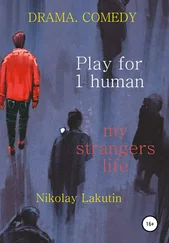Douglas Hofstadter - I Am a Strange Loop
Здесь есть возможность читать онлайн «Douglas Hofstadter - I Am a Strange Loop» весь текст электронной книги совершенно бесплатно (целиком полную версию без сокращений). В некоторых случаях можно слушать аудио, скачать через торрент в формате fb2 и присутствует краткое содержание. Жанр: Прочая документальная литература, на английском языке. Описание произведения, (предисловие) а так же отзывы посетителей доступны на портале библиотеки ЛибКат.
- Название:I Am a Strange Loop
- Автор:
- Жанр:
- Год:неизвестен
- ISBN:нет данных
- Рейтинг книги:4 / 5. Голосов: 1
-
Избранное:Добавить в избранное
- Отзывы:
-
Ваша оценка:
- 80
- 1
- 2
- 3
- 4
- 5
I Am a Strange Loop: краткое содержание, описание и аннотация
Предлагаем к чтению аннотацию, описание, краткое содержание или предисловие (зависит от того, что написал сам автор книги «I Am a Strange Loop»). Если вы не нашли необходимую информацию о книге — напишите в комментариях, мы постараемся отыскать её.
I Am a Strange Loop — читать онлайн бесплатно полную книгу (весь текст) целиком
Ниже представлен текст книги, разбитый по страницам. Система сохранения места последней прочитанной страницы, позволяет с удобством читать онлайн бесплатно книгу «I Am a Strange Loop», без необходимости каждый раз заново искать на чём Вы остановились. Поставьте закладку, и сможете в любой момент перейти на страницу, на которой закончили чтение.
Интервал:
Закладка:
What determines “where I am”? If we once again postulate the idea of obtaining nutrition by carrying out certain remote actions, and if we add back the ability to control distant motion by means of a joystick or even by certain brain events, then things really start to shimmer in uncertainty. For surely a mobile robot is not where the radio-connected computer that is controlling it happens to be sitting. A robot might be strolling about on the moon while its computerized guidance system was in some earthbound laboratory. Or a self-driving car like Stanley could be crossing the Nevada desert, and its computer control system might be on board or might be located in a lab in California, connected by radio. But would we even care where the computer was? Why should we care where it is located?
A robot, we feel, is where its body is. And so when my brain can switch at will (using the fancy glasses described above) between inhabiting any one of a hundred different bodies — or worse yet, when it can inhabit several bodies at the same time, processing different kinds of input from all of them at once (perhaps visual input from one, sonic from another, tactile from a third) — then where I am becomes extremely ill-defined.
Varying Degrees of Being Another
Once again, let’s leave the science-fiction scenarios behind and just think about everyday events. I sit in a plane coming in for a landing and overhear random snippets of conversations around me — remarks about how great the Indianapolis Zoo is, how there’s a new delicatessen at Broad Ripple, and so forth. Each snippet carries me a smidgen into someone else’s world, gives me the tiniest taste of someone else’s viewpoint. I may resonate very little with that viewpoint, but even so, I am entering ever so slightly into that person’s “private” universe, and this incursion, though absolutely trivial for a human being, is far deeper than any canine’s incursion into another canine’s universe ever was.
And if I have untold thousands of hours of conversation with another human being on topics of every imaginable sort, including the most private feelings and the most confidential confessions, then the interpenetration of our worlds becomes so great that our worldviews start to fuse. Just as I could jump to California when talking on the telephone with Scott Kim in the Imlac room, so I can jump inside the other person’s head whenever, through words and tones of voice, they call forth their most fervent hopes or their most agonizing fears.
To varying degrees, we human beings live inside other human beings already, even in a totally nontechnological world. The interpenetration of souls is an inevitable consequence of the power of the representationally universal machines that our brains are. That is the true meaning of the word “empathy”.
I am capable of being other people, even if it is merely an “economy class” version of the act of being, even if it falls quite a bit short of being those people with the full power and depth with which they are themselves. I have the good fortune — at least I usually consider it fortunate, though at times I wonder — of always having the option of falling back and returning to being “just me”, because there is only one primary self housed in my brain. If, however, there were a few high-powered selves in my brain, all competing with each other for primacy, then the meaning of the word “I” would truly be up for grabs.
The Naïve Viewpoint is Usually Good Enough
The image I just conjured up of several selves competing for primacy inside one brain may have struck you as extremely weird, but in fact the experience of internal conflict between several “rival selves” is one that we all know intimately. We know what it is to feel split between wanting to buy that candy bar and wanting to refrain. We know what it is to feel split between driving “just another twenty miles” and pulling off at the next rest stop for a desperately needed nap. We know what it is like to think, “I’ll just read one more paragraph and then go fix dinner” and also to think, “I’ll just finish this chapter first.” Which one of these opposing inner voices is really me ? In growing up, we learn not to ask or try to answer questions like this. We unthinkingly accept such small internal conflicts as simply part of “the human condition”.
If you simultaneously dip your left hand into a basin of hot water and your right hand into a basin of ice water, leave them both there for a minute, and then plunge them into a lukewarm sink, you will find that your two hands — usually your most reliable scouts and witnesses of the outer world — are now telling you wildly opposite things about the very same sinkful of water. In reaction to this paradox, you will most likely just shrug and smile, thinking to yourself, “What a strong tactile illusion!” You aren’t likely to think to yourself, “This cognitive split inside my brain is the thin edge of the wedge, revealing the illusoriness of the everyday conviction that there is just a single self inside my head.” And the reason nearly everyone would put up great resistance to such a conclusion is that for nearly all purposes, the simple story we tell ourselves is good enough.
This situation is a bit reminiscent of Newtonian physics, whose laws are extraordinarily reliable unless there are objects moving near each other with a relative velocity approaching the velocity of light, and in such cases Newtonian physics goes awry and gives very wrong answers. There is no reason at all, however, to abandon Newtonian physics in most familiar situations, even including the calculations of the orbits of spacecraft traveling to the moon or other planets. The velocities of such spacecraft, although huge compared with those of jet airplanes, are still minuscule fractions of the speed of light, and abandonment of Newton is not in the least called for.
Likewise, why should we abandon our commonsense attitudes about how many souls inhabit our brains when we know very well that the answer is just one ? The only answer I can give is that, yes, the answer is very close to one, but when push comes to shove, we can see small deviations from that accurate first approximation. Moreover, we even experience such deviations all the time in everyday life — it’s just that we tend to interpret them as frivolous illusions, or else we simply ignore them. Such a strategy works quite well because we never approach the “speed of light” where the naïve, caged-bird picture fails badly. Less metaphorically, the lower-resolution, coarse-grained souls who fight and squabble for the chance to inhabit our brains never really pose any serious competition to “Number One” for the overall command, and so the naïve old caged-bird dogma “One brain, one soul” stands unchallenged nearly all of the time.
Where Does a Hammerhead Shark Think it is?
Perhaps the most forceful-seeming challenge to the thesis that a single soul — your own, say — is parceled out among a number of distinct brains is simply the question, “Okay, let’s suppose that I’m somehow distributed over many brains. Then which one do I actually experience ? I can’t be simultaneously both here and there!” But in this chapter I have tried to show that you can indeed be in two places at the same time, and you don’t even notice anything funny going on. You can be in Bloomington and in Stanford at the same time. You can be in a Donner Pass ski lodge and a Midwest town’s kennel play area at the same time. You can be in your living room’s plush armchair and in an uncomfortable carriage bouncing along a nineteenth-century English country road at the same time.
If these examples are too far-fetched or too technological for your taste, then just think of the lowly hammerhead shark. The poor thing has eyes on opposite sides of its head, which look out, quite often, on two completely unrelated scenes. So which scene is the shark really seeing? Where does it consider itself to be, really ? Of course no one would ask such a question. We just accept the idea that the shark can “sort of” be in those two different worlds at the same time, mainly because we think to ourselves that no matter how different those scenes look, they nonetheless are contiguous pieces of the underwater world in the shark’s vicinity, so there is no genuine problem about whereness. But this is glib, and sidesteps the point.
Читать дальшеИнтервал:
Закладка:
Похожие книги на «I Am a Strange Loop»
Представляем Вашему вниманию похожие книги на «I Am a Strange Loop» списком для выбора. Мы отобрали схожую по названию и смыслу литературу в надежде предоставить читателям больше вариантов отыскать новые, интересные, ещё непрочитанные произведения.
Обсуждение, отзывы о книге «I Am a Strange Loop» и просто собственные мнения читателей. Оставьте ваши комментарии, напишите, что Вы думаете о произведении, его смысле или главных героях. Укажите что конкретно понравилось, а что нет, и почему Вы так считаете.












